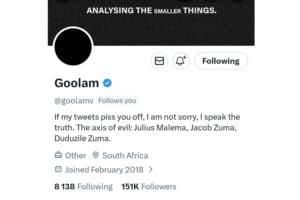It would be foolhardy to expect quick fixes in restoring SA to its glory days after the ruinous Jacob Zuma years.

Talk to several professionals in business and politics, and a common narrative is doing the rounds. ‘Ramaphoria’ and the New Dawn, they say, has waned as the sobering reality of South Africa’s increasing economic malaise has set in.
In brief, ‘Ramaphoria’ was the wave of positive sentiment unlocked by Cyril Ramaphosa’s election in February as president of the country after nine years of corruption and severe economic and moral decline under Jacob Zuma. Ramaphosa’s arrival unleashed a social contract dubbed the New Dawn, a roadmap for reviving a broken economy, tackling unemployment, promoting good governance and flushing out corruption.
Although the New Dawn has only been in action for four months, many have ruled it out, along with ‘Ramaphoria’. Like smoke, the New Dawn has evaporated into nothingness, writes one Moneyweb columnist.
Pay attention to the intense news cycle, and it may feel like SA is regressing. But progress has been made despite the New Dawn being in its infancy. After all, it hasn’t quite received the chance to gain momentum across various state organs. The role of business and society in it remains a mystery.
Foolhardy to expect quick fixes
Ramaphosa inherited a state that had lost the credibility to govern. It will take time to build a capable state from scratch and for economic and socio-economic indicators to reflect reforms. Instead of being a crafty president, Ramaphosa has been distracted by the unenviable task of cleaning up the state.
Persistent structural problems engineered by the governing ANC have also heightened worries about the current state of affairs.
At a time when SA should be taking advantage of the global economic recovery, domestic growth of 1.5% has been pencilled in by the National Treasury. Unemployment sits stubbornly at 26.7% (first quarter of 2018) and 52.4% among the young people in SA. Loss-making and debt-burdened state-owned entities Eskom and South African Airways (SAA) continue to guzzle taxes in the form of bailouts. Already placed on junk, SA’s credit rating is on thin ice.
Government is mulling policies that could potentially inhibit business investments including the Mining Charter and more amendments to the Black Economic Empowerment Codes of Good Practice. Already battling with sustained living costs, income-earners might be taxed even more to fund National Health Insurance. Virtually no day goes by without service delivery protests, a clear indication that South Africans are growing angry and desperate.
Positive moves
Despite the shopping list of challenges, Ramaphosa’s track record has so far been positive.
Ministers with strong links to the corrosive state capture project, including Lynne Brown, Mosebenzi Zwane and Des van Rooyen, have been fired. So have Zuma acolytes Faith Muthambi, David Mahlobo, Bongani Bongo and Nathi Nhleko.
Board members and senior managers with close ties to the Gupta family at Eskom, SAA, SA Express, Transnet and Denel have been removed and replaced by individuals with credible pedigrees. The SABC can continue with its constitutional mandate of broadcasting without political interference after wholesale changes to its board and top management.
Commissions of inquiries that will investigate corruption and the state capture network have been set up by Rampahosa. These include the inquiry into tax administration at Sars (taking place now) and the commission of inquiry into state capture, which begins in August.
Public consultations are currently under way on government’s highly divisive proposal to expropriate land without compensation. Having recognised that land is an emotive topic, the government appointed a Constitutional Review Committee to weigh up the constitutional merits of expropriating land without compensation. Whatever the decision is on expropriating land, at least a wide and thorough consultative approach will have taken place, rather than it being an overnight decision.
Despite Bathabile Dlamini’s incompetence as the former social development minister, the payment of social grants continued uninterrupted. With Dlamini recently removed from the department, commercial banks and the South African Post Office are reporting a better working relationship with new minister Susan Shabangu. The Post Office is now primed to be the only social grants distributor by September.
These are just some of the gains delivered by the New Dawn. SA needs to give Ramaphosa a chance to prove how innovative he is in addressing structural economic and social issues. In return, Ramaphosa needs to deliver progress.
The public’s patience for talks and promises is paper-thin.
Brought to you by Moneyweb






